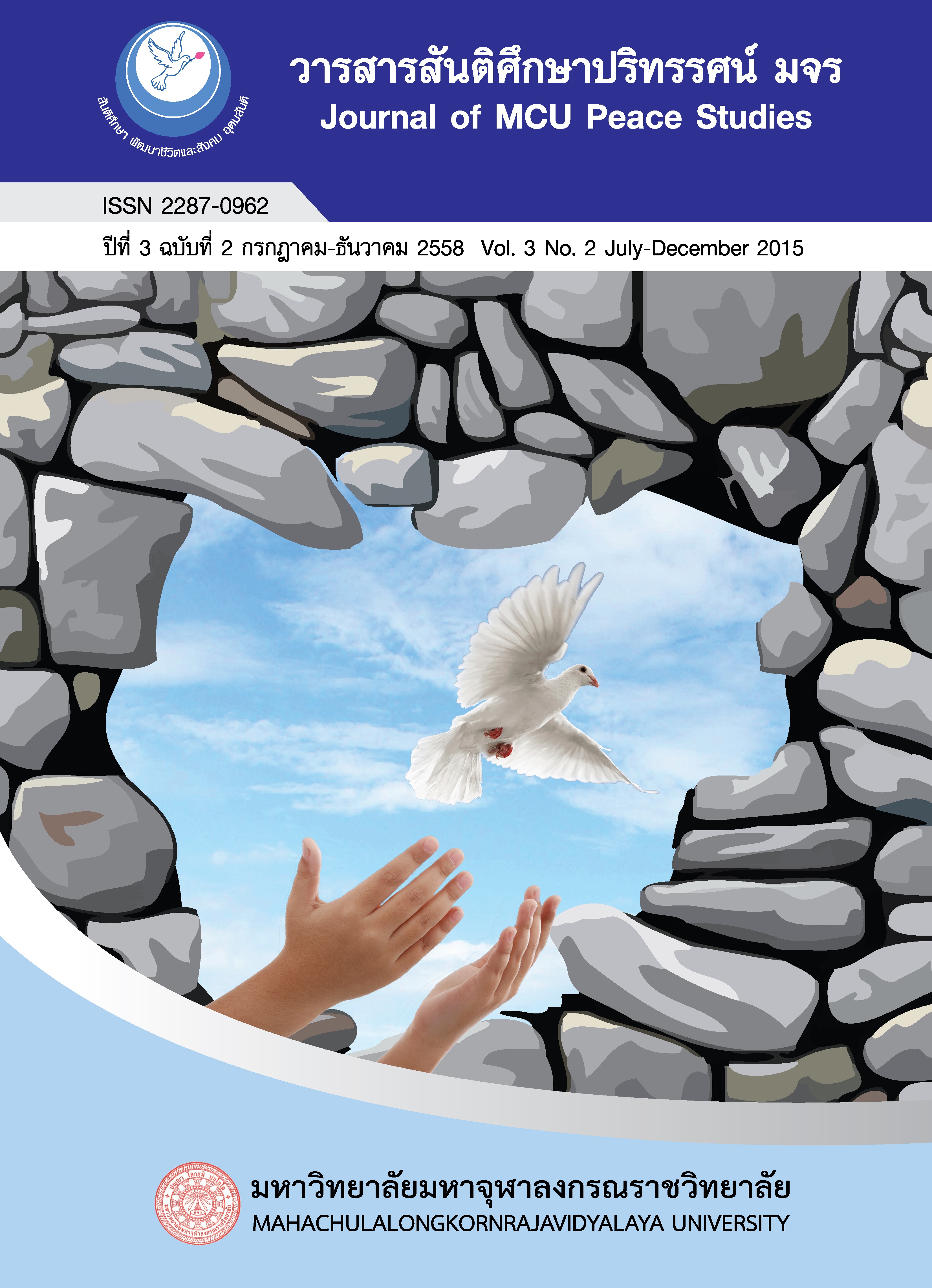THE WAYS OF THE MANAGEMENT IN BUDDHIST TEMPLES FOR PEACE ACCORDING TO SAPPAYA 7 : THE CASE STUDY OF WAT THANNAMLAI, SURATTHANI PROVINCE
Main Article Content
บทคัดย่อ
This research consists of 3 objectives. i.e.. (1) to study the concepts and theories of peace and theoretical organization (2) to study the management of Wat Thannamlai (Suanmokkhaphalarama) according to Sappaya 7 and (3) to present The Ways of the Management in Buddhist Temples for Peace According to the Seven Sappaya for Wat Thannamlai (Suanmokkhaphalarama). The Research is Qualitative Research by In-Depth-interview with Key Informant and to observe and participate in manual activities as tools to analyze the data collected by the application in accordance with the corporate Temple Management Peace.
From the research it is found that Concepts and theories of temple management according to Suppaya 7 is meant to create conducive conditions are factors contribute to educational practice. Factors contributing to the wellbeing and development. The right to develop the best results. Allows a boom stand Prosperity not decline advocating a place or a person who is comfortable with each other support especially to help support the practitioners and palliative treatment of intellect with 7 at the temple where the orbit of alms or food & beverage reflect talking to promote the party. The near and mental calm steady light temperature and nutrients food soundly sleeping environment for the organization of peace and serenity. From the data analysis it is found that Wat Thannamlai (Suanmokkhaphalarama) has got the systems of such management in the mentioned departments by emphasizing clearness and transparency with the models of its Management Committee in the management of each department. The systems are managed by the ways of convenience and efficiency of which can be seen through the works divided into each department with its direct responsive staff. This yields quite convenience for the coordination. From the interviews it is also found that the staff of each department has good intention and follows the rules designated by the temple very well.
The Ways of the Management in Buddhist Temples for Peace According to the Seven Sappaya for Wat Thannamlai (Suanmokkhaphalarama) and other organization. From the Research it found that that The Ways of the Management in Buddhist Temples for Peace According to the Seven Sappaya suitable for the co-existence and right to conduct practice. In the building the management of traffic both inside and outside the temple. Management of the Missionary. Management personnel Management cuisine the management of the air and the environment. Management activities and projects should be planned. Should be supervised and instructed. Should be targeted and cost-effective. And other factors to strengthen the management measures to achieve peace.
Article Details
ทัศนะและความคิดเห็นที่ปรากฏในบทความในวารสาร ถือเป็นความรับผิดชอบของผู้เขียนบทความนั้น และไม่ถือเป็นทัศนะและความรับผิดชอบของกองบรรณาธิการ ยินยอมว่าบทความเป็นลิขสิทธิ์ของวารสาร
เอกสารอ้างอิง
ก. ข้อมูลปฐมภูมิ
มหาวิทยาลัยมหาจุฬาลงกรณราชวิทยาลัย.พระไตรปิฎกภาษาไทย ฉบับมหาจุฬาลงกรณราช
วิทยาลัย. กรุงเทพมหานคร:โรงพิมพ์จุฬาลงกรณราชวิทยาลัย. ๒๕๓๙.
ข. ข้อมูลทุติยภูมิ
(๑) หนังสือ :
กรมการศาสนา. ก.คู่มือพระสังฆาธิการว่าด้วยพระราชบัญญัติกฎระเบียบและคำสั่งของคณะสงฆ์.
กรุงเทพมหานคร: กองแผนงาน, ๒๕๔๒.
คณะกรรมการวิจัย มหาวิทยาลัยรามคำแหง สาขาวิทยบริการเฉลิมพระเกียรติ จังหวัด กาญจนบุรี.
“แรงจูงใจในการปฏิบัติงานของบุคลากรมหาวิทยาลัยรามคาแหง สาขาวิทยบริการเฉลิม พระเกียรติ จังหวัดกาญจนบุรี”. รายงานผลการวิจัย. มหาวิทยาลัยรามคำแหง. ๒๕๕๓.
ติน ปรัชญพฤทธิ์. ศัพท์รัฐประศาสนศาสตร์. กรุงเทพมหานคร: จุฬาลงกรณ์มหาวิทยาลัย, ๒๕๓๕
พระธรรมปิฎก (ป.อ. ปยุตฺโต). พุทธธรรม ฉบับประมวลธรรม. พิมพ์ครั้งที่ ๑๗. (กรุงเทพมหานคร:
โรงพิมพ์มหาจุฬาลงกรณราชวิทยาลัย . ๒๕๕๑). หน้า ๒๐๙-๒๑๐.
พระราชรัตนมุนี (ชัยวัฒน์ ปญฺาสิริ). การจัดสาธารณูปการและสาธารณะสงเคราะห์ของวัด.
กรุงเทพมหานคร: โรงพิมพ์การศาสนา, ๒๕๓๘.
พระธรรมปิฎก (ป.อ. ปยุตฺโต). พุทธธรรม ฉบับประมวลศัพท์. พิมพ์ครั้งที่ ๑๗. กรุงเทพมหานคร:
โรงพิมพ์พระพุทธศาสนาของธรรมสภา, ๒๕๕๔.
พระพรหมคุณาภรณ์ (ป.อ. ปยุตฺโต) Phra Brahmagunabhorn (P.A. Payutto). พจนานุกรมพุทธ
ศาสตร์ฉบับประมวลธรรม Dictionary of Buddhist. พิมพ์ครั้งที่ ๑๐. กรุงเทพมหานคร: บริษัท เอส อาร์ พริ้นติ้งแมสโปรดักส์ จำกัด, ๒๕๔๕.
พระพุทธโฆสาจารย์. คัมภีร์วิสุทธิมรรค. แปลและเรียบเรียงโดย สมเด็จพระพุฒาจารย์(อาจ อาสภ
มหาเถร). พิมพ์ครั้งที่ ๖. Taiwan: The Corporate body of the Buddha Educational Foundation, ๒๕๔๘.
เสนาะ ติเยาว์. หลักการบริหาร. กรุงเทพมหานคร: มหาวิทยาลัยธรรมศาสตร์, ๒๕๔๔.
(๒) บทความ
จันทรานี สงวนนาม. เอกสารประกอบการสอนบรรยายหลักสูตรผู้บริหารสถานศึกษาระดับสูง.
กรุงเทพมหานคร: ม.ท.ป.. ๒๕๓๖). หน้า ๔.
ประวัติท่านพุทธทาส คัดจากหนังสือ พุทธสาสนา ปีที่ ๖๗ เล่ม ๒ พุทธศักราช ๒๕๔๒.
๒. ภาษาอังกฤษ
Ernest Dale. Management: Theory and practice. (New York: McGraw Hill. 1973). Harold D. Koontz. Principle of Management. (New York: McGraw-Hill. 1972). p. 43.


